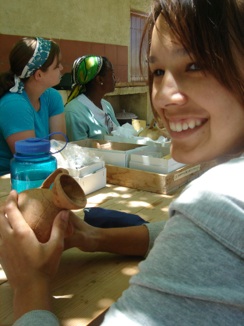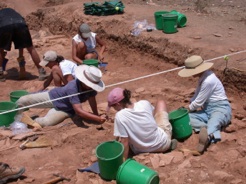Yeronisos Island Expedition

NYU Yeronisos Island Field School
For over twenty years, the NYU Yeronisos Island Archaeological Field School has educated students in the aims, scope, and tools of field archaeology, the practice of field survey and stratigraphic excavation, and the ways in which we deal with archaeological evidence.
Field training includes: surface survey and field walking; principles of stratigraphic excavation, using a level and laser theodolite, taking elevations, computer aided drawing and design, setting out an excavation grid square, keeping a field book; field and aerial photography; drawing of site plans and stratigraphic sections; rubble wall consolidation, use of geo-textiles, and backfilling; health and safety in the field and on the sea; site visits, community outreach and education.
Afternoon seminars include: pottery washing, conservation, and analysis; drawing pottery profiles, glass, and metal objects; object photography; registration of finds, data entry and the Yeronisos Island Expedition Database; conservation of ceramics and stone; organizing a storeroom; writing final field reports; Neolithic and Chalcolithic Cyprus; Ecology of Western Cyprus; Ptolemaic Rule in Cyprus; Late Roman and Byzantine Cyprus; Archaeologies of Cult and Religion; Hellenistic Pottery: Shapes, Wares, and Functions; Reading Greek Inscriptions.
Students participate in excursions to the nearby Chalcolithic sites of Lemba and Kissonerga; the Experimental Chalcolithic Village at Lemba; the Neolithic/Chalcolithic Cemetery at Souskiou; the Roman villas and mosaics at the House of Theseus, the House of Aion, and the House of Dionysos in Nea Paphos; the Hellenistic “Tombs of the Kings” at Kato Paphos; The Sanctuary of Aphrodite at Palaipaphos and the Kouklia Museum; the Persian Siege Mound at Palaiphaphos; the Paphos Museum; the sanctuary of Apollo Hylates at Kourion; the Acropolis, Basilica, and Theater at Kourion; the Geroskipou Folk Art Museum; the Monastery and Byzantine Museum at Agios Neophytos; the Byzantine Churches at Asinou and Lagouthera; the Crusader Castle at Kato Paphos and other Medieval sites of the Paphos region; the Akamas Peninsula and Avakas Gorge; and the Sea Turtle Conservation Project at Lara Beach.
The Yeronisos Island Field School carries 4-course credits in the New York University Summer School I Program, usually falling during a four or five-week period of roughly May 19-June 25th. Fees include those for course credits, room and board, and airfare.
Members of the archaeological field program are required to know how to swim and to be in good physical health and condition. Yeronisos is a particularly challenging site. Each day we must cross the sea, climb a 21 meter cliff carrying heavy gear, and then excavate in the hot sun for eight hours. We welcome team members who have enormous energy and stamina, as well as commitment to collaborative teamwork and the greater goals of the project.

(c) 2012


